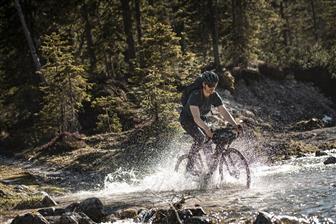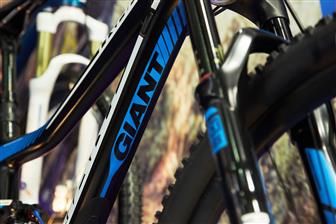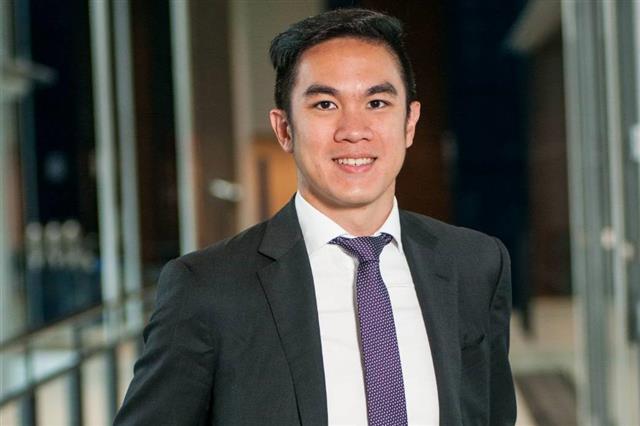Climate change is changing many aspects of our everyday life. Transportation is one of them. Seeing the boom of e-bikes and the opportunities of green mobility, Marcel Yang, Giant Bicycles' special assistant to CEO, mentioned that Giant is creating an economic ecosystem in the cycling industry where all the partners can work closely together. He also shared his experience in driving innovations in this bike manufacturing company.
Yang will be joining alongside Rachel Lau, managing partner at RHL Ventures and lululemon Taiwan GM Gulshan Kumar at the next Asia Venturing webinar, co-powered by DIGITIMES and Anchor Taiwan, on the topic of "how to innovate with traditional non-tech industries" (Sept 13 SF | Sept 14 Taipei)
Q: Giant is an outstanding Taiwan company that has a global presence. Would you like to introduce your background and your previous experience before joining Giant as the special assistant to the CEO?
A: Before I joined Giant Bicycles, I was responsible for project management at one of the world's largest translation and language services company. It's an interesting, dynamic, and fast-paced industry. I primarily serviced healthcare and pharmaceutical clients and dealt with 15-20 different projects every day and each project was unique. It is very service-oriented, where engaging a client to define his/her need is half the job, while the other half is delivering on those needs. As time went by, I developed more into operations, building up teams across the globe, etc.
Q: From those experiences, what can you bring to Giant for their innovations?
A: The number one perspective that I have been iterating and found useful, is the intense focus on figuring out what the customer "actually" needs. Half of the time it is not clear to them either. How do we test that and not fully take what we are told for granted? That is definitely a discipline I bring to Giant on a daily basis.
As a full-value-chain global company that spans R&D, manufacturing, and marketing, Giant is an economic ecosystem, with echoes of the modern entrepreneur-VC dynamic found within.
When I look at that and start to appreciate the depth and complexity of the conglomerate, for the time being, I focus on doing the next right thing for the entire value chain.
Q: How does Giant do innovation internally and externally?
A: Internally, we have a small group of the younger crew who are great at interpreting and thinking of potential future applications, understanding that more likely than not, it won't work, but we try it anyway.
For external innovations, we typically engage our supply chain partners. A lot of innovations constantly face this decision point, like whether the consumer is better served by Giant working on the R&D itself, or working with an external partner to realize the goal?
We often engage suppliers and partners to discuss these concepts. On one hand, we innovate for value creation, and on the other is for value capture. What's the trade-off? At the end of the day, what is more sustainable? If we over-emphasize value-capture, we might lose a lot of chances to bring a whole new market into existence. Vice-versa, we might fail to deliver returns to our stakeholders. Figuring out that balance drives the need for internal and external innovation.
Nowadays when people talk about innovation and ecosystems, most think of tech firms and startups. But in traditional manufacturing, at least in the Giant world, we have been doing that with existing suppliers through projects or products. For every new product we end up releasing, there are at least 10 others that we have weeded out in various stages. Each of those involves internal development and external collaborations. This dynamic is where I draw parallels between the Giant and startup ecosystems. Connecting upstream innovators with downstream consumers, we end up being partially a platform for others and partially an innovation instigator.

Giant Revolt E+ PRO e-bike, whose rugged electric assist systems are designed to enable further explorations off the beaten path. Photo Credit: Giant Bicycles
Q: How many such partners are in your ecosystems of innovation right now? Are you open to considering mergers and acquisitions as means to get an external source of innovation?
A: We are constantly working to find good partners. Historically speaking, mergers and acquisitions at Giant tend to originate with existing business partners because we have already overcome that mutual trust barrier. It is the same with startups for us too. Starting a relationship based on doing business is an effective way of gaining trust and aligning on our values before breaching the M&A subject. It is not unlike dating.
In varying degrees of product collaboration alone, there are about 10 partners. Five to six of them are bigger players, across time zones and geographies. Often, we challenge each other to push our abilities to scale up or collaborate on some novel ideas.
In the end, it really comes down to cultural fit, pace, and different levels of expectations. People or organizations that end up thriving in Giant's ecosystem tend to have certain characteristics, from a work ethic and values standpoint. Giant is approaching the 50th year of history. We survived so far because of those values, and we look for those values in our partners, too. We can have a place for wilder experimentation that is reasonably insulated from the efficiency-driven day-to-day and incremental innovations. That environment is what I am trying to foster within the organization right now. There is always a raw drive for the "how we can create new opportunities" kind of innovation, and it needs a protective firewall to insulate it until the new idea can stand on its own. Striking that balance and enabling both types of innovations to thrive is an important step for us.
Q: In terms of technology, some companies use internet of thing (IoT) technology by attaching sensors to components to gain insights. Does Giant also do that?
A: We do, actually. The cycling industry as a whole, I would say within the last 5-10 years, has started to make those leaps into adopting IoT. What's interesting about cycling is, bicycles have existed for more than 200 years, and it always has the focus on simplicity, mechanics, letting human drive things.
Lately, with IoT, motors and batteries have started to be attached to bicycles in increasing amounts, and it is an interesting development for sure. Currently, the value and use for these additions range in a wide spectrum. On one hand, we could add a motor so that you don't need to pedal so hard. On the other hand, we have IoT technologies developed to amplify the personal cycling experience. The ecosystem is very, very diverse. We have companies that make sensors, those that create algorithms, and of course, we have companies that make the hardware. There are also companies that do it all, and those tend to be recognizable brands for cycling or otherwise. Overall yes, IoT on bikes is here to stay. A couple of years back, we built out an independent subsidiary (AIPS Technology Co. Ltd.) that focuses on developing and manufacturing these IoT and smart products.
The typical IoT devices and applications we currently work with are more focused on augmenting the cycling experience, and less so with predictive maintenance. There is an interesting reason -- weight. Every piece of sensor adds weight. If it is powered by a battery, that adds more weight. For a product that is widely recognized as "lighter is better," adding a hundred grams through sensors without an outsized boost in experience can end up being a net negative to the bike's perceived value.
Q: What new trend has Giant spotted during the Covid-19 pandemic period? It seems globally more people started to ride bicycles than before. And electrical bikes are also becoming popular? What are the post-pandemic opportunities that you have been observing?
A: The "bike boom" has certainly caught international headlines, and we are very happy to see more people experiencing the joy of cycling than ever before.
The e-bike market growth is explosive, and it is such a broad new market. We are working to define and capture a piece of that market. I have heard ideas that in the coming years, significant proportions of the people who drive cars these days are going to ride e-bikes for short-to-mid-distance travel instead. That kind of paradigm shift is huge. What kind of bikes would serve these new consumers? Are we the best positioned to serve them? These are the types of constant analysis we do every day.
Europe is an exciting arena for e-bikes. Its market growth trajectory already looks like a hockey stick, while other parts of the world are at different stages with e-bike adoption. Over the past 10 years, the European e-bike market looks to have grown 20%-30% each year, with only a few outliers; but difficult to predict future market size. The rise of e-bikes and micro-mobility is at least partially related to the rise of climate change concerns, and it is this fundamental issue that we hope to address, be it through our process or product innovations.
The next big thing for us is environmental, social & corporate governance (ESG). We are taking it very seriously, primarily with the E part. It is a huge undertaking that we are endeavoring to deliver. The circular economy of cycling, not just the technical element of it, but also the business aspect of it, would drive important change to the environment. To that end, we are making a concerted effort to address the environmental impact issue in a fundamental way, from manufacturing processes to retail to product end-of-life re-cycling or up-cycling. We have chosen this path to stay true to the "green" image of bicycles and deliver on its promise of a sustainable environment that ultimately benefits society, our industry, and our business.
Marcel Yang's Bio:
As special assistant to CEO, Marcel Yang evaluates strategic cross-industry collaboration opportunities for Giant Group. He holds a Bachelor's degree in Chemistry from Duke University and an MBA from Yale School of Management.
Coming from an operations management background in the language services industry where he has created innovative service models for major healthcare and pharmaceutical clients, Yang combines western entrepreneurial and service-oriented perspectives with an on-the-ground understanding of eastern traditional industry cultures, to foster novel-yet-sustainable innovations within Giant. Yang also serves as Category Manager, in charge of all aspects of Youth Bikes businesses at Giant Group. A lifelong athlete and foodie, Yang enjoys road cycling, swimming, racing, as well as weekend barbecues with friends.

Credit: Michael Lee
(Editor's note: Asia Venturing is a series of monthly roundtables with roadmaps to the future focusing on the hype v.s. the reality of Asia's supply chain-boosted innovation ecosystem, jointly powered by DIGITIMES and Anchor Taiwan. We bring together leading industry luminaries, corporate strategists, experienced investors, and entrepreneurs to expand your network and redefine the possibilities of cross-border opportunities. The replay of the latest session can be seen on DIGITIMES or Anchor Taiwan)




